- Home
- Charles de Lint
Moonheart Page 7
Moonheart Read online
Page 7
But for all his comical appearance, accentuated by his penchant for floppy hats and baggy overcoats, the old man surely knew his stuff. That had become apparent from their first meeting across a table in the visiting rooms of St. Vincent de Paul Penitentiary outside of Montreal. The old man had been the visitor.
It was in late ’69 and Kieran was serving two years for B&E and another two years for possession of cannabis with intent to traffic. The sentences ran concurrently. In real time, he’d do sixteen months. He had two left to go, having been passed over in his parole review.
He met the old man in the middle of three days of solitary confinement—having been sent there for talking out of turn with a guard. The detention cell, called the hole, was six feet by ten, with a pallet on the floor, an enamel sink and potty, and little else. They took away all your clothes except for your underwear and gave you a pair of white overalls. Then, when they locked the big iron door that took up almost the whole of one wall of your cell, you sat there for however long a term you’d pulled. He’d been surprised when the guard came for him. Naturally the guard hadn’t told him anything; just as naturally, Kieran hadn’t asked where they were going. He changed from overalls to grey pants and shirt, put on his jacket and boots, and silently preceded the guard across the compound to the buildings that housed the prison’s offices. It wasn’t until they were inside that the guard finally spoke.
“You’ve got a visitor, Foy. Go on through.”
A visitor? You didn’t get visitors when you were in the hole. You lost all your privileges. He opened his mouth to ask what was going on, then thought better of it. What the hell. A visitor? He couldn’t think of who it might be, but went on down the hall, stopped to be frisked by another guard before going into the visitors’ room, then went in and saw Thomas Hengwr for the first time.
That first view made him reconsider his earlier thought of, well, whatever was going on, at least it was a break in the monotony. He’d never seen such a weird-looking individual before, but what stopped him from laughing outright, or even smiling at the old man’s appearance, was the uncomfortable sense of. . . . In retrospect years later, he realized it was the sense of power that hung over the old man that’d kept him from laughing. He learned later that few people saw Tom in that light.
“Kieran Foy?” were the old man’s first words. “Come in, come in. Have a seat. I’m very pleased to meet you.”
Kieran stayed by the door.
“Who’re you?” he demanded.
“Thomas Hengwr,” the old man replied, bowing comically. “At your service. Sit, sit! Don’t be shy.”
Shaking his head, Kieran crossed the room and sat across the table from him. Before he could speak again, Tom’d dug a sheaf of ratty-looking paper from one of the voluminous side pockets of his overcoat. He showed Kieran a picture of himself, taken before he was busted.
“Not a bad likeness, don’t you think?” Tom asked.
“Sure. But listen—”
“Now,” Tom interrupted, studying his papers. “Let’s see. You became a ward of the Children’s Society in . . . hmm. Sixty-four. Is that correct? Quit school as soon as you legally could—you were quite a troublemaker, weren’t you? Then. . . .” He riffled through the pages. “There’s not a whole lot more really, except for hearsay and rumors. Fascinating material, though. A couple of vagrancy charges. Drugs, nothing major. One conviction—you pulled probation on that one. What was it? A year? Then you were arrested in Hull for breaking and entering and drew time on both charges.”
“Is there a point to all this?”
The old man straightened the papers, laid them on the table between them and lifted his gaze to meet Kieran’s. There was something eerie about his eyes.
“Are you very happy with the way your life seems to be going?” Tom asked.
Kieran shook his head—not so much in reply, as for amusement.
“What’s it to you?” he asked. “Are you a social worker or something?”
“A question for a question,” the old man said. “Well, here’s another: do you know Alice Sherwin?”
“Alice . . . ?”
But then he remembered. Mrs. Sherwin. She ran a secondhand bookstore down in the Glebe that he used to frequent—as much for her company and their long talks over tea as for the books that he never seemed to get enough of. She’d been like . . . like an aunt to him, he supposed. She was a little flaky, what with her Tarot cards and horoscopes and all, but nothing too serious.
“Look,” he said at last. “I don’t know what you’re after, but I think you’re barking up the wrong tree. If you’re offering me parole, I’d rather do my time. All I’ve got is two months left, for Christ’s sake. If you’re writing a book or something, I’m not really [not] worth your time. Joe master criminal I’m not. And if you’re here to save my soul, I’m not interested.”
“Your soul,” the old man murmured.
He said it in such a way, with his deep green eyes glittering, weirdly, that a spooky chill ran up Kieran’s spine.
“It’s curious that you should mention that,” Tom said, “because that’s exactly why I am here. No Bible-thumping, I assure you. Nothing fancy. It’s just that I happened to mention to Alice—she’s a mutual acquaintance, you see, my suspicious friend—I happened to mention to her that I was looking for a . . . how should I put it? An apprentice would be the best term.”
“Apprentice in what?”
“In the Way.”
When the old man spoke that word, sudden vistas seemed to open before Kieran. It was as though he saw his life unfold before him in a multitude of possibilities. He saw himself going on as he was, in and out of jail, living in squalor, then dressed in a slick suit like some Mafiosa underling. It was a gritty view, from the underbelly of life, and he already had a foot half in it. Then he saw himself going straight—nine-to-five job, drifting in a morass of boredom from which there was no escape because the mortgage payments had to be made, content to be one of many drones in a secure world that held no surprises.
There were other views—variations on those two for the most part. They were like roads undulating into the distant days to come, some straight and narrow, confining, others broad and painted in broad gaudy strokes. Then his attention centered on one that ran in and out of the others like a twisting footpath. On it he saw himself as himself, unassuming but fulfilled. For no reason he could articulate, that road in particular drew him, for in it he saw his potential nourishing. He seemed to hear music and a distant voice singing. Barely, he made out the words:
Don’t you see yon bonny, bonny road
that lies across the ferny brae,
that is the road to fair Elfland,
where you and I this night maun gae. . . .
The singer had the same voice as that of the old man who sat across from him and the realization of this brought him back down to earth. He blinked, trying to bring Tom’s face into focus.
“No illusions,” the old man said. “If you follow the Way, it’ll be the hardest thing you’ll ever do. And the most rewarding.”
Kieran hardly heard what he said. He had no pretensions concerning his worth, present or future. He’d never thought of looking for a way out of what he’d become. With little education except for the patchy results of his eclectic reading, no formal training nor any productive interests, there wasn’t a whole lot he could aim for. But now. . . . He felt he was being offered something that was all he could ever want. Later he could never find the words to describe how he’d known this, or how he’d felt at that moment. Nor what made him choose what he chose.
“Alice recommended you,” Tom said, “and now that I’ve met you myself, I have to concur with her. You’re a rough diamond, Kieran Foy, but a diamond all the same. Will you come with me?”
Kieran came all the way down to reality.
“What?” he asked.
His thoughts were still somewhat blurred and he wasn’t able to bring the
old man’s features into focus completely.
“You mean right now?” he added. “I mean, I can’t. That is, I don’t want to break out or anything. . . .”
Tom laughed. “I’d hardly ask that.”
“What exactly are you asking?”
“I want someone to teach, someone to study with me. A companion, a friend.” He tapped his head. “I’ve so much stored away in here. I want to pass some of it on before I go.” He smiled. “It all seems strange, doesn’t it? The Way is a wordless thing—a concept that’s hard to shape words around. But . . . you sensed it, didn’t you? Despite your lack of knowledge, you still knew something, didn’t you?”
Kieran nodded slowly, remembering the . . . vision?
“Trust what you felt,” the old man said. “Trust that knowledge. For now it’s intuitive, but it will become clearer in time. That, at least, I can promise you.”
Kieran looked around the visitors’ room, looked down at the prison clothes he was wearing, and remembered what lay ahead of him. Another day and a half in the hole. Two more months in the pen. Those were the hard facts. But faced with the certainty of some mystic promise that was reflected in the old man’s curious eyes, none of it seemed important. He had the feeling at that moment that nothing was impossible to the individual who faced him across the table and found that he wanted that same sense of . . . purpose for himself. That serenity.
“Are you with me?” Tom asked.
Kieran had no choice. It was like being asked do you want to be nothing, or everything?
“Yes,” he said. “Only how . . . ?”
Tom shook his head. “Leave that to me.”
He returned his sheaf of papers to his pocket and stood up to call the guard.
“There seems to be some sort of mistake,” Tom said to the guard when he came. “My friend was supposed to be discharged today.”
Kieran wasn’t sure he’d heard right. He looked into the guard’s face and saw his own confusion reflected there. Then the guard nodded.
“We’d better go talk to the warden,” he said.
Turning, he led the way.
No one stopped them or questioned them. Kieran wasn’t frisked coming out of the visitors’ room. Everything passed in a blur. They reached the warden’s office and before Kieran really knew it, he was given back his personal effects, had changed into some clothes that the old man had brought with him—jeans, a flannel shirt, boots and a tweed sports jacket—and they were standing outside the prison.
“That’s it?” Kieran asked. “Is it . . . is it even legal?”
“Oh, quite so. There’s still some paperwork to be done, but that won’t take them long.”
“But . . . how did you get them to do that?”
The old man shrugged. “I think we’ll go to Ottawa, what do you say? I’ve a place up in the Gatineau—a ski lodge that a friend’s letting me have for awhile. We can work there on weekends. You can do what you like during the week.”
“But. . . .”
Tom led him to an old beat-up Chevy that was parked in the lot. Kieran remembered standing by the car, hand on the hood, and looking back at the grey walls of St. Vincent de Paul Penitentiary. The sky was blue, and there were no walls around him. He could go anywhere, do anything.
“Let’s go,” the old man said. “This place depresses me. We can talk on the way.”
That was how it all began.
“More coffee?”
The waitress’ voice startled him out of his reverie. He looked up and saw that the restaurant was filling up with people. The clock above the door that led to the kitchen read 7:10.
“Non, merci,” he murmured. “Just the bill.”
Three coffees, one-twenty. Whatever happened to the bottomless cup? Kieran wondered as he paid at the cash register. The waitress smiled briefly as she handed him his change and told him to have a nice day.
“I’ll give it a try,” he said.
With his change, Kieran had a grand total of a dollar-eighty left in his pocket. He needed money and a place to stay. But most of all he needed to find the old man. This was, if nothing else, his chance to repay him for that day in St. Vince and all the years since.
“Why did you want a student?” he’d asked Tom once.
“For immortality.”
“Immortality?”
The old man had smiled. “You’d have to be as old as I am to fully appreciate what I mean, Kier. Everyone has the need to leave their mark on the world. The old craftsfolk took on apprentices so that their own skills lived on. They still do this in places like Japan. Civilized country, Japan. You’ll find traces of that in the Maritimes and the backwoods of Quebec, too, though the skills are mostly passed down through the family.”
“Like an inheritance?”
“Somewhat. But it’s more the sense that all I’ve worked on won’t go to waste. When I’m dead, I’ll live on—in you. You’ll amend what I’ve taught you, add to it, drop things that don’t work so well for you, but the core will still be my teachings. That’s my immortality. And not only mine, but my teacher’s before me, and his before him. It goes back a long way.”
A long way. The Way.
Kieran’s method of dealing with the horseman outside of Jean-Paul’s was just a side effect of that learning. It was a flashier aspect, for, as with the martial arts of the East, the visible manifestations cloaked the true heart of the matter. The old man’s Way wasn’t much different from the teachings of Taoism or the writings of Thoreau. It had a basic truth to it as important in this day and age when so much more existed to diffuse it as it had in the lost years of its shaping. Such a thing was worth preserving. It deserved immortality.
Kieran had hardly understood any of it that afternoon in the visitors’ room in St. Vincent de Paul. It had taken the old man to show him that the Way was something he’d been looking for all his life, but had had no point of reference to, so that he might have recognized it himself. He owed Tom Hengwr more than he could ever repay.
Buttoning up his jacket, he stood in the doorway of Tomorrow’s for a moment, surveying the street with more than his eyes, weighing the vibes. He was new to this cloak and dagger game. Who was to say that the construction worker waiting at the bus stop wasn’t watching for him? Or that the businessman with his vinyl briefcase and trendy moustache wasn’t a horseman?
Kieran sighed. Was it still paranoia when you knew someone was after you? He stepped out onto Bank Street. At the corner he looked around once more, then set off east on Frank, heading for Sandy Hill. What he needed now was some information. He only hoped that some of the old crowd was still hanging around.
Chapter Four
8:30, Wednesday morning.
RCMP Special Inspector John Tucker was not happy. He sat in his office, elbows propped on his desk, chin cupped in his hands, frowning at his coffee. He was a big man—206 pounds on a six-foot frame—with short-cropped brown hair that was greying at the temples, a squared moustache and pale grey eyes. He had the sort of skin that didn’t tan, though it reddened when he was in the sun—or when his blood pressure went up. Last week he’d celebrated his forty-fifth birthday. Today there wasn’t anything to celebrate. His face was flushed and Dr. Lawrence Hogue, who was sitting across the desk from him, was all too aware of that fact.
Tucker had been only a little irked when he was put in charge of the security for Project Mindreach. (Project Spook was more appropriate. Christ, who thought up these code names anyway?) It had seemed like a simple enough operation at the outset: Project Mindreach would specialize in documenting the viability of psychic resources, should they exist. But the whole thing had soured from the word go. That always happened when you put a CM—Civilian Member of the Force—in charge. The trouble was, if it all fell apart now, it was going to be his ass in the sling. Not the Superintendent’s. Not Hogue’s. His.
He sat up and glared across the desk.
“Any more bright ideas?” he demanded.
“I’ve got a meeting with Superintendent Madison at noon,” Tucker said, “and he’s got an appointment with Williams at two. The Honorable Minister is going to want more than a handful of surveillance reports for his eight mill’. Surveillance reports don’t mean shit. We need some results.”
“Foy should have led us to the old man,” Hogue said.
“Foy’s looking for the old man as well.”
“What?”
“You heard me.”
Tucker leaned back in his chair to stare out the window. He could see the Rideau River from his office.
“Gagnon picked Foy up at Ottawa Station a little before midnight,” he said wearily. “They went back to his place on Powell, had something to eat and shot the shit for awhile. When Gagnon got up this morning, Foy was gone.”
“Who was on the stakeout?” Hogue liked using words like that. It made him feel like he was part of a television show SWAT team. “Didn’t he see anything?”
“He saw lots of things—old ladies walking their dogs, kids making out . . . but he didn’t see Foy. He’s filling out a report downstairs if you want to talk to him. Constable Thompson. Paul Thompson. He’s a good man. I worked with him on an operation in Vancouver this summer.”
“But not good enough, it seems.”
Tucker frowned. “If these guys are really the spooks you make them out to be, it’s not too surprising, is it?”
“You don’t believe it’s possible, do you?”
“It doesn’t matter what I believe. It doesn’t even matter if they’ve got three eyes and four arms. What I need is some results, and I need them yesterday.”
“But—”
“Look,” Tucker said wearily. “We’ve been through this before. I think something weird’s going on. Sure. But I’m not about to call in the exorcist, okay? You show me some proof, and we’ll talk about it again. I just want to get on with my job and sitting around on my ass isn’t doing my job.”

 Widdershins
Widdershins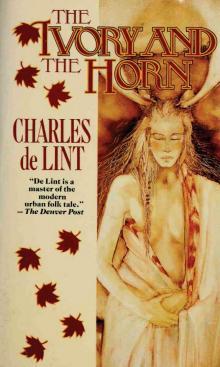 The Ivory and the Horn
The Ivory and the Horn Yarrow
Yarrow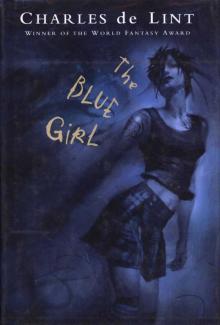 The Blue Girl
The Blue Girl Spirits in the Wires
Spirits in the Wires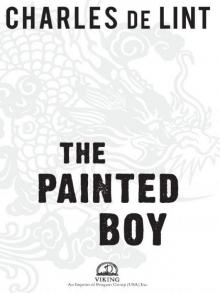 The Painted Boy
The Painted Boy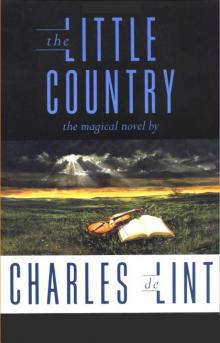 The Little Country
The Little Country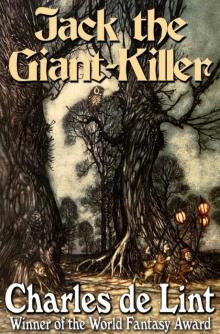 Jack of Kinrowan: Jack the Giant-Killer / Drink Down the Moon
Jack of Kinrowan: Jack the Giant-Killer / Drink Down the Moon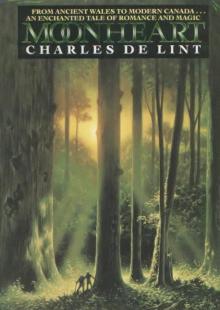 Moonheart
Moonheart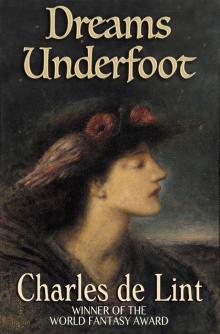 Dreams Underfoot
Dreams Underfoot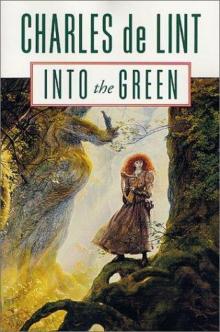 Into the Green
Into the Green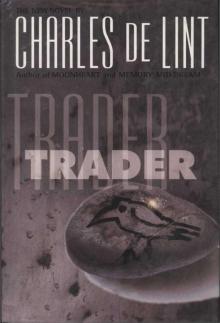 Trader
Trader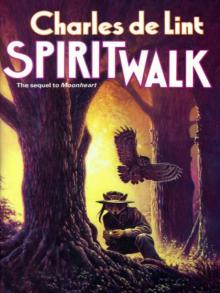 Spiritwalk
Spiritwalk Someplace to Be Flying
Someplace to Be Flying Jack in the Green
Jack in the Green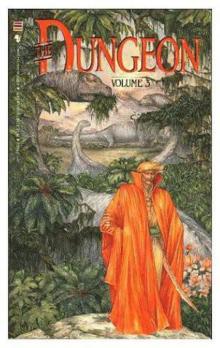 The Valley of Thunder
The Valley of Thunder Out of This World
Out of This World The Cats of Tanglewood Forest
The Cats of Tanglewood Forest Seven Wild Sisters
Seven Wild Sisters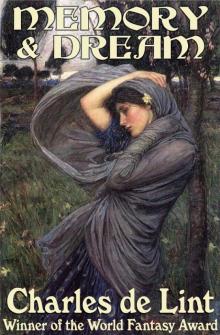 Memory and Dream
Memory and Dream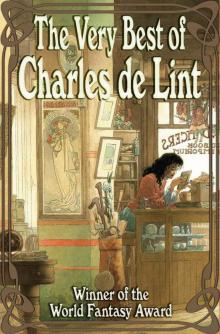 The Very Best of Charles De Lint
The Very Best of Charles De Lint Under My Skin
Under My Skin Forests of the Heart
Forests of the Heart The Newford Stories
The Newford Stories Moonlight and Vines
Moonlight and Vines Angel of Darkness
Angel of Darkness The Onion Girl
The Onion Girl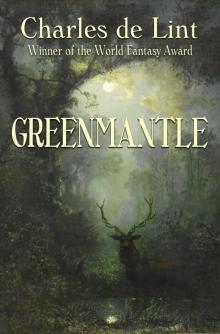 Greenmantle
Greenmantle Waifs And Strays
Waifs And Strays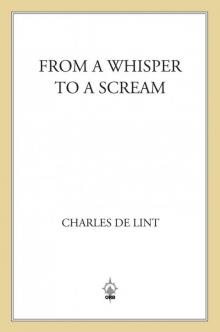 From a Whisper to a Scream
From a Whisper to a Scream Over My Head
Over My Head The Ivory and the Horn n-6
The Ivory and the Horn n-6 Our Lady of the Harbour
Our Lady of the Harbour Dreams Underfoot n-1
Dreams Underfoot n-1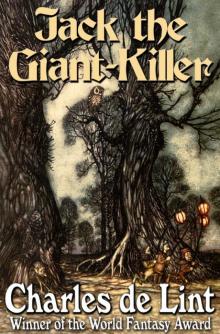 Jack the Giant-Killer (Jack of Kinrowan Book 1)
Jack the Giant-Killer (Jack of Kinrowan Book 1)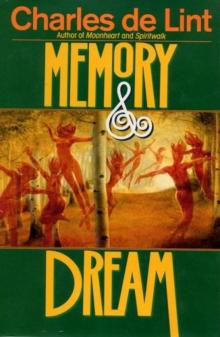 Memory and Dream n-5
Memory and Dream n-5 Under My Skin (Wildlings)
Under My Skin (Wildlings) Newford Stories
Newford Stories The Wind in His Heart
The Wind in His Heart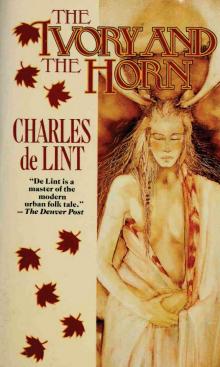 Ivory and the Horn
Ivory and the Horn